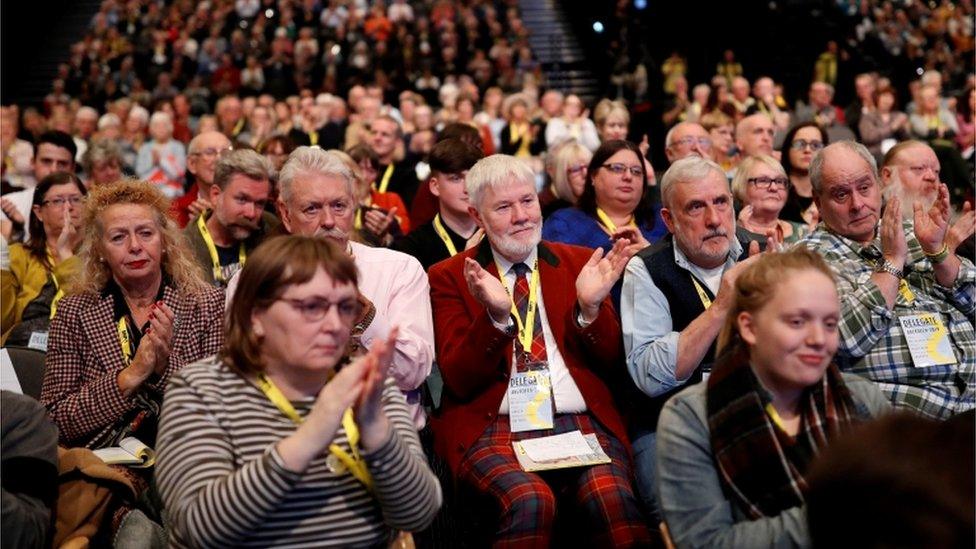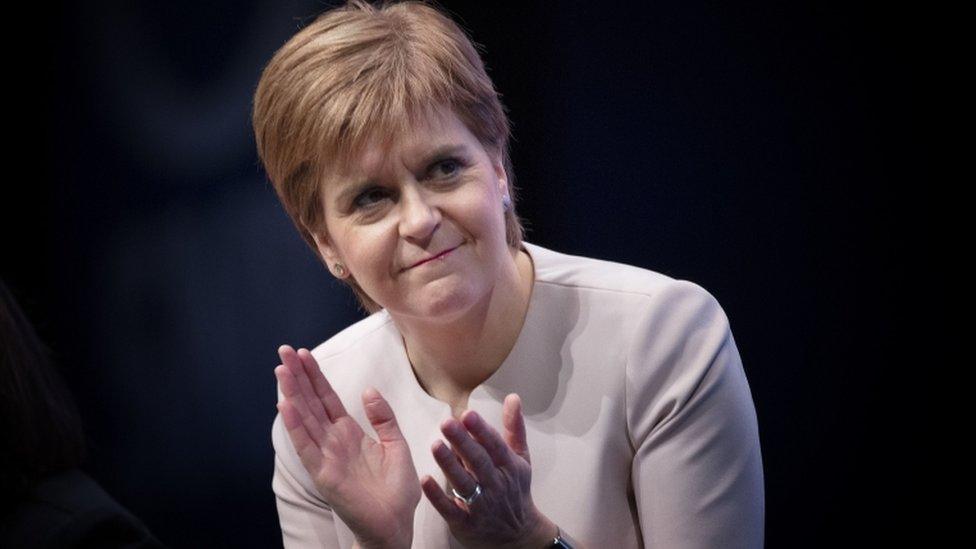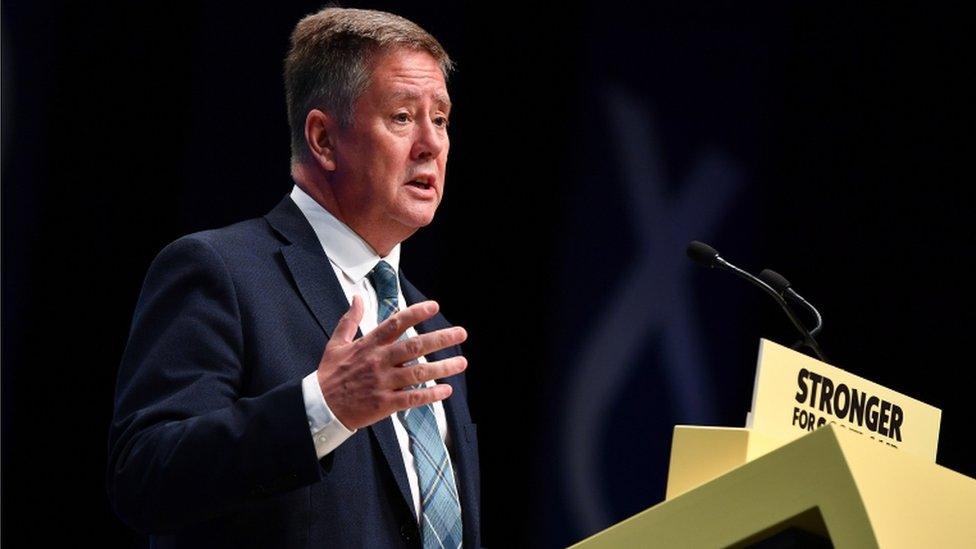A faintly surreal SNP conference
- Published

This has been, in truth, a faintly surreal conference. Not, to be clear, that this curious atmosphere owes anything to the SNP.
Firstly, there is the venue, the new Aberdeen conference centre on the outskirts of the city.
Again, for clarity, the facilities are excellent, the staff more than helpful, the adjoining hotels comfortable. But, still, it is all rather remote from the city, contributing slightly to a sense of isolation.
There it stands, proud and defiant in wide open spaces. Several delegates have compared it to a hyper-posh airport terminal.
One suggested to me it bore a resemblance to the power HQ of a James Bond rivals. Cat stroking optional.
But there are two other reasons why this conference stands out as different. One external. One internal.

Delegates overwhelmingly rejected a bit to have a so-called Plan B for independence discussed
The external influence is that the political story is palpably elsewhere. Not in the Commons where Lewis Carroll would struggle to summate a voluble discourse on a legislative programme which few expect to proceed, at least not in the present Parliament, there assembled.
No, the story lies in Brussels. Or, rather, with the participants seeking a last-minute deal in respect of the UK's departure from the European Union.
It would seem, as I argued from the outset, that the prime minister, at least, is actively seeking an agreement, whatever the inclinations of the more zealous Brexiteers towards the purity of a no deal exit.
One, because he has seen the expert reports suggesting that no deal will be economically, socially and diplomatically damaging.
Two, for political reasons. If he is, despite other options, prevented from taking the UK out on 31 October, regardless, then he might face a tricky syllogism and a tricky doorstep conversation in the event of an election.
But, Mr Johnson, you said you would get Brexit done. What happened? In vain will he talk of obstacles, of frustration, of the Establishment. By then, the voter's hand may be hovering over another party's place on the ballot paper.

Ms Sturgeon will urge the party to reach out to No voters in her keynote speech
Boris Johnson knows that a much simpler pitch for him will be to go to the voters, saying: you wanted this sorted, I responded.
So, all of this plays out at the SNP conference in Aberdeen. Like the rest of us, they have to wait for the outcome of those talks, either way.
That requires a single transferable approach from conference speakers, including the first minister.
They have to excoriate no deal while simultaneously arguing that any likely outcome, under Mr Johnson's stewardship, will run sharply counter to Scotland's interests.
To be fair, the party leadership has done that rather skilfully. They have placed pressure on other Westminster opposition parties, Labour and the Liberal Democrats, to oust the Conservatives, to install an interim administration, to defer Brexit, then to hold a general election.
Thus far, these discussions have foundered on the name of the interim PM. But the SNP has made good ground.
Then, there is the internal issue. At what pace, in what fashion, should the SNP progress its aim of independence?
There is evident restlessness. But how would it be other? These delegates, young and old, yearn for independence. It defines them as politicians and people.

Keith Brown was one of many senior party figures who urged patience with Ms Sturgeon's indyref2 strategy
However, it is evident that a clear leadership narrative has now emerged around this issue. And, what is more, it has demonstrably won membership support, not least in a vote on Sunday to reject contemplation of "Plan B".
In advance of the conference, Nicola Sturgeon told me in a remarkably frank interview that she was not, in effect, interested in grand gestures.
She wants a referendum sanctioned by statute - which means Westminster agreement, as in 2014.
Not an unofficial plebiscite, which might be boycotted and ignored. Not a mandate arising from a UK or Holyrood general election whereby the SNP might win a majority of Scottish seats, but on a minority of the popular vote. Which might not be globally recognised.
In her speech this afternoon, she will expand upon this theme, linking it to the issue of Brexit. She'll say that an independent Scotland, back in the EU, can form a bridge for other nations on these islands.
In a conscious echo of pro-Union rhetoric, she'll call this "the best of both worlds."
Needs to be patience
But, alongside this upbeat oratory, this conference has been one of subduing expectations. Yes, the leaders have all said, you are eager for independence. We are too. We get the concept.
But there needs to be patience. Soon, but not now, there will be an opportunity for a referendum. Not during the continuing disquiet and uncertainty of Brexit.
Derek Mackay said it. John Swinney said it, blending some Braveheart rhetoric with tactical caution. As billed, Nicola Sturgeon said it in advance.
And today, at conference, her deputy Keith Brown pursued this argument in a thoughtful address to delegates to close the morning session, prior to the FM's keynote speech.
Mr Brown made three core points. One, that Scotland deserved a chance to rethink, in the light of Brexit. But that Scotland would not beg for Westminster's permission to hold such a plebiscite.
Two, that the party faithful must work as never before. And three, most importantly, that they must adapt their campaigning to suit the circumstances of the time.
Again, Mr Brown acknowledged that delegates were impatient, that they regarded the rightness of independence as a given.
But he counselled them to treat others with respect, especially those who had markedly different views from the SNP. They must be cajoled and persuaded, not hectored.
Now, of course, such ideas do not operate in a vacuum. The SNP's opponents will reject the concept of a rerun referendum. The Scottish secretary, Alister Jack, did just that on Good Morning Scotland this morning.
But it is plain that the SNP leadership has contemplated the challenge of placating internal restlessness - and has discerned a strategy to turn it into slower-burning tactical advantage.
